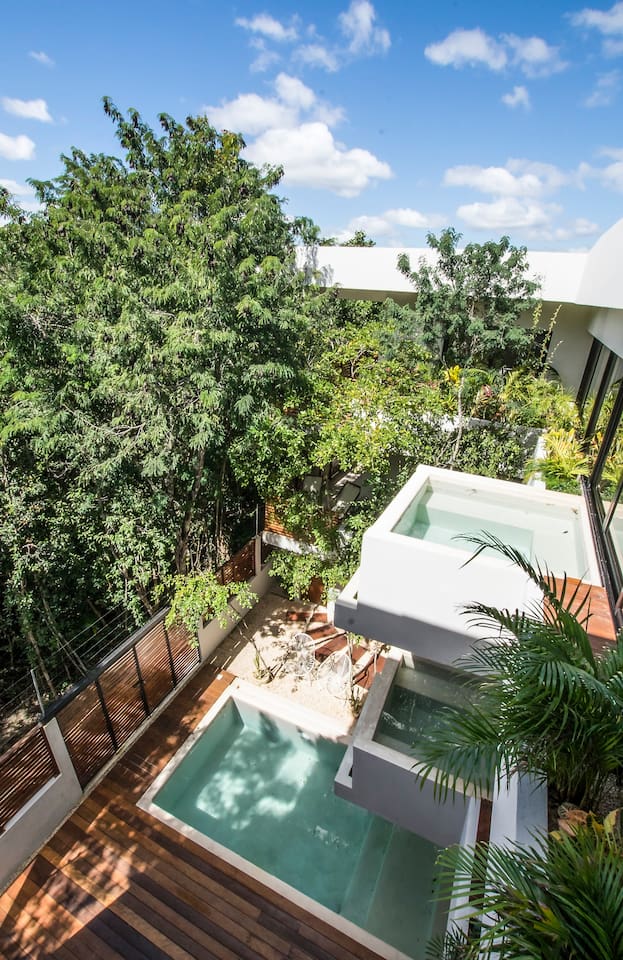In Y Combinator’s early days, founders would move to Palo Alto, split a two-bedroom with five others to save money and trade notes around the clock with their new, like-minded roommates.
Now, as remote work continues and the pandemic persists, scores of entrepreneurs are working from home around the world. Y Combinator isn’t requiring its recent cohorts to relocate and collaboration is a screen-to-screen affair.
Now that they can work from literally anywhere, many entrepreneurs are forming homes with other founders. Hacker homes, the newest iteration of remote work adaption, feels like a nostalgic attempt to recreate some of the synergies COVID-19 wiped out. Generally speaking, it’s a nod to the digital nomad lifestyle, but in some cases, hacker homes feel closer to Hype House, a TikTok mansion laden with sponsored indulgence and wealth.
For Greg Isenberg, a growth advisor to TikTok and former head of strategy at WeWork, entrepreneur homes are a signal of what the foreseeable future of building could look like.
“The type of vibe you used to get from Y Combinator just doesn’t exist anymore,” Isenberg said, as these houses could recreate some of the scrappiness and like-mindedness that defined the incubator’s early days.
While some see founder communes as vehicles for creating a more level playing field, critics say the model perpetuates Silicon Valley cultural constructs that favor white men.
In other words, sometimes there’s a cost to after-work happy hours making a comeback.
Product Hunt, and then TikTok
Michael Houck, a former product manager at Airbnb and Uber, rented a home in Tulum, Mexico in May 2020. He put $21,000 of non-refundable money on his credit card and invited friends and people he met on the internet before hopping on a plane. Anyone who came had to be okay with a few rules: you must pay rent, launch projects and you have to be okay with building your company in public.
In all, 18 entrepreneurs, including Houck, formed The Launch House. Residents include former startup fellowship participants from On Deck, product managers and solo entrepreneurs. On the plane ride over, house founder Brett Goldstein launched its first tool.

“How do you actually launch a consumer product? You need wide reach, influence, community and media properties all together,” Goldstein said. “I wouldn’t say we’re the next Y Combinator, but the next YC would look something like that.”
In just a few weeks, The Launch House has produced nine products, including a discovery platform for the best OnlyFans accounts, an anonymous Twitter bot that sends positive comments and tools that enhance newsletter and email reading experiences.
Launch House members described a strong focus on inclusion when populating future homes and just opened up the application process for Launch House 2. One way the house is trying to give access to other people is by open-sourcing information and projects that residents build together.
The website has a Launch Library where builders can submit their email addresses to access resources on how to build anything from a podcast to a clothing brand to a community.
“There’s this sort of veil of mystique that surrounds a lot of entrepreneurs and founders,” Goldstein said. “The curtain has been lifted, and now you can get a social media perspective, and inside look at what it takes to start and launch a company.”
Now, more than 1,500 people are on the Launch House waitlist. Multiple investors have approached the group to sponsor internal and external events and some companies have even asked for the right to do product placements.
The concept has surely brought in an audience, and copycats: an unaffiliated group called The Rocketship House posted a trailer on Twitter in October:
https://twitter.com/rocketshiphouse/status/1315912528833077248
When reached via e-mail, organizers of Rocketship House declined to answer specific questions about the launch, or as they put it, “blast off.” The group confirmed that it is funded by a few unnamed large investors based in Beverly Hills, and includes a mix of marketers and influencers that invest in social media. It is currently accepting applications, drawing itself as similar to a TikTok mansion.
“Similar to Sway House [a residence for TikTok personalities], we will be making fun and dramatic dope bro content, centered around launching startups. We all live exciting lives, and there’s plenty of drama, so we’re excited to showcase that,” the e-mail from Rocketship House read.
Not all entrepreneur homes are following suit in terms of strategy, for more reasons than one.
‘Everyone that was working in a WeWork is now working out of a house’
Nearly 3,000 miles away, an entrepreneur mansion in Los Angeles called The Pineapple Palace — named because its residents believe the fruit brings good luck — is five months into a one-year lease.
Pineapple Palace inhabitants include a soon-to-be doctor, lawyer, engineers from Apple and Tesla, a Thiel fellow, the creator of a design agency, plus the founder of Bolt, a checkout company that has raised over $100 million in venture capital. And a farmer-turned-Instagram-influencer named Nick.
Behind the home is AJ Scaramucci, co-founder of pre-launch startup Pandos and the oldest son of former White House Director of Communications Anthony Scaramucci. He launched the home with co-founder Alex Klokus.
“Everybody in the house is either running their own company or has aspirations to do so,” Scaramucci said. Unlike The Launch House, he said The Pineapple Palace is focused less on creating founder influencers, and more about recreating the synergies you could once find in a WeWork.
“There are individual clusters, there are communities, there are families aggregating with one another and there’s trust there,” he said.
How to do remote work right, from the teams that know it best
The Pineapple Palace has been key for Scaramucci and Klokus when building Pandos, which sifts through different kinds of biotech intellectual property to try to find drugs — both prescription and over the counter — that it can buy exclusively. The deal structuring requires legal consulting, but Scaramucci says their in-house lawyer has provided “tens of thousands” of dollars’ worth of free advice.
“We joke that we’ve got so many people in the house that have different pieces of expertise that you just yell down the hallway if you have a problem,” he said. “And then it magically gets solved.”
But it’s not all work. The Pineapple Palace has an additional layer of extravagance built into its seven-bedroom, nine-bathroom environment: the six-car garage has been turned into a co-working space, and last month, the housemates held a mini-Olympics with nine events, pitting the top floor against the bottom floor.

At the Pineapple Palace, everyone pays rent, Scaramucci notes, saying that “this isn’t a Pied Piper situation,” referring to the fictitious company in HBO’s Silicon Valley.
And for good reason. The hacker house setup changes when a home is created to house a specific team all working on a specific company, but blending home and work environments brings up a flurry of questions: Should a founder charge rent? If work is life and life is work, how are employees compensated? And what happens to the lease if a team member quits their job?
Yury Yakubchyk is the founder of startup Sprout, a startup that works on child autism care inspired by his own personal story with mental health struggles. Yakubchyk is sponsoring a six-bedroom house in Palo Alto for his six-person team. In the Sprout House, there are small meeting rooms on the first floor, as well as a pool, a tennis court and a gym.
Yakubchyk says he doesn’t charge employees a penny for rent.
“You have to treat [the house] like any other business expense because long-term in this environment, it’s your office,” he said. “This is where you’re meeting VCs, grabbing coffee with them and maybe going for socially distanced walks in the neighborhood.”
Yakubchyk pays for the house using funds he has from his companies, which both earn more than $100 million in ARR. “There is still no better way to start a business than physically starting within the valley in a residential setting with other people.”
“Everyone that was working in a WeWork is now working out of a house with their teammates,” Yakubchyk said. “The way you scale [my] business is actually getting more houses for people to live in.”
What the Valley thinks
Another home isn’t as bullish. In Sedona, Arizona, the CEOs of seven venture-backed startups, including Anomalie, Culdesac, TrueWork, Levels and others, have created a home together simply to avoid loneliness.
The Sedona House is the opposite of extravagant. People who have sold four companies are sleeping on the floors and couches, the dining room table is lined with 15 monitors, and it’s more coding vibes than chill vibes.

“I’m not particularly interested in being a proponent either way for this type of living,” said Calley Means, the co-founder of Anomalie. “We see this as a very unexpected and, you know, potentially creative way to deal with the quarantine.”
In other words, a getaway similar to the way spring breakers go to Miami. It also comes as a contrast to the vision of The Launch House and Yakubchyk, who see homes as a future way to scale builders and innovation.
Both visions, on either side of the spectrum, could pose a series of risks. On the condition of anonymity, several operators and founders expressed disdain or neutrality for the homes.
“If someone amazing was building one, then I’d consider it,” one founder said, noting lack of diversity and the potential for catching/spreading COVID-19. Another noted that the homes spin out gimmicky projects and most are run by white and Asian men.
When asked if they would invest in a founder participating in one of these houses, one investor said they would view it as a negative signal, adding that they would probably ask the founder to consider leaving post-funding.
Andy Rebele, founder of Pure Watercraft, started Seattle’s first hacker home in 2013 and scaled the business to a number of properties. He says he’s cautious about hacker homes making a comeback, especially during a pandemic.
Pure Watercraft ramps up its electric outboard motors with a $23M series A
“This whole model makes no sense with the coronavirus,” he said. “I can’t imagine anyone doing one of these right now; you’re not supposed to be that close to each other.”
Rebele’s hacker homes were different from the entrepreneur mansions popping up now. His goal with hacker homes was to give techies a cheap way to live in a startup hub. Still, he’s dubious if the homes are inclusive living situations.
“If you have a big company, you’re going to have a spectrum of people that work there, and some of them are past the part of their life where they want to live with a bunch of other people and have no life,” Rebele said. “Maybe it works for interns.”
For the most part, the houses skew male. The Launch House has six women and 13 men, The Sedona House has four women and six men, and the Pineapple Palace is split 50/50 on gender. Yakubchyk did not disclose specific information on diversity, but said “over half of the house is from a diverse background,” noting that there are two women, four religions and over half of the house comes from an immigrant background.
One venture capitalist said they viewed the houses as irresponsible, but stopped short of blaming the founders who participate. Instead, the VC said responsible investors should refrain from sponsoring projects that could negatively harm minorities.
A prominent VC raised the example of Bravo TV’s “Startups: Silicon Valley,” a single-season show about a hacker home in 2012 that was produced by Randi Zuckerberg.
“Good reality TV does not make people look good,” they said. It could perpetuate harmful tropes that disproportionately impact minorities, such as angry black ladies or promiscuous women.
“I wouldn’t want a founder of mine to do one, full stop,” the venture capitalist said. “Not if they’re serious about being a founder.”































Comment